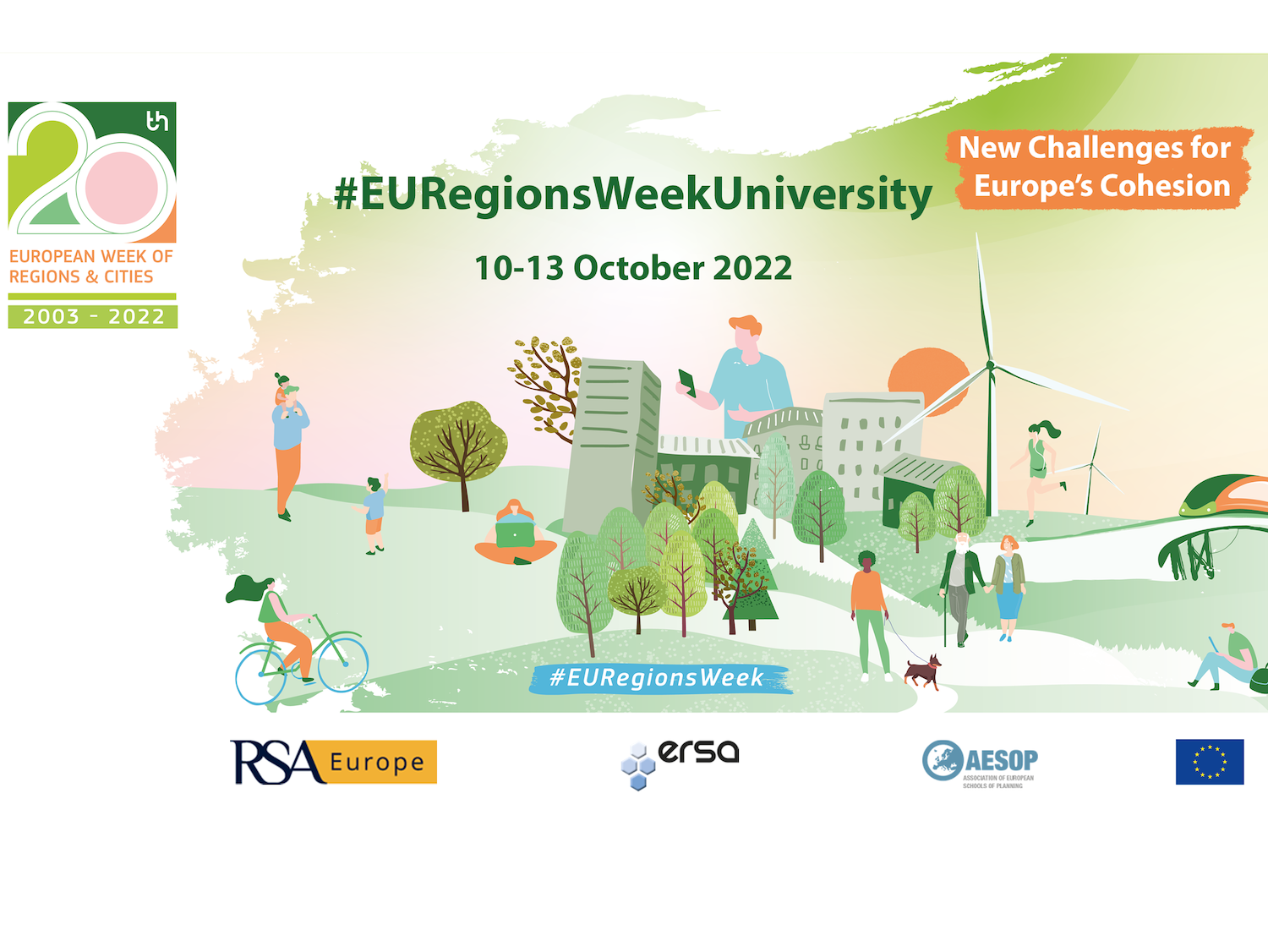AESOP is pleased to be working again as a key partner during the #EURegionsWeek. The #EURegionsWeekCollege and the #EURegionsWeekUniversity are organised by the European Commission, Directorate-
All info here: https://europa.eu/regions-and-
The following webinars are free to attend but as places are limited, we recommend signing up as soon as registration has opened to avoid disappointment.
Tuesday 11th October 2022
- EU Cities as Green Deal Actors - 09.30-11.00 CEST
The session proposes to reflect on the role that cities need to play so that the EU is able to achieve the ambitious objectives of the European Green Deal. While cities are increasingly recognised by EU institutions as central actors in this regard, the EU governance and policy frameworks in which they operate limit their capacity to contribute to the digital, green and just transition proposed by the Green Deal. The session will focus on these issues aiming to engage the audience in this timely reflection. - The Impact of Digital Transition in Rural Areas, how to Avoid Exclusion and Inequalities - 11.30-13.00 CEST
The workshop will discuss the diffusion and impact of digitalization, with a particular focus on issues pertaining to sustainable and more inclusive agro-ecological transition. The session will address questions such as: How do we avoid exclusion, inequalities and the increase of digital divide inside rural areas and between rural and urban areas? The session discusses the conditions that can promote fair, equitable, healthy, and environmentally friendly food systems. Policy support is needed to ensure that a digital divide is avoided and to maximize the potential for more inclusive societies by 2040. To provide the expected effects, it is important to be aware that digitalization is, first of all, a process of social transformation, which takes place both as an effect and as a driver of technological change. - Digital Sustainability? Potentialities and Pitfalls of Digitally Supported Ecological Transition - 14.30-16.00 CEST
The digital revolution is widely impacting urban governance in European cities. We know that digital tools are potentially adequate to make sustainability transition more efficient, effective and broadly accessible. However, the association between digitalization and sustainability is questionable as it may produce both progressive and regressive socio-environmental implications. We invite participants to engage with the potentialities but also the pitfalls of digital sustainability, including the impacts of digitech on global environmental changes and its socio-environmental costs. - Tourism as a Driver of Social Exclusion: Old and New Challenges for the Urban Agenda 16.30-18.00 CEST
The ambition of the H-2020 SMARTDEST project is to contribute towards urban policy agendas that take tourism mobilities seriously. It thus studies how urban inequalities are produced and coped with in regions and cities that are the hub of tourism and other forms of temporary dwelling; and explores innovative solutions in the face of such challenges, through citizen and stakeholder participation. This session will present early insights at the European regional level and in selected case studies.
Wednesday 12th October 2022
- Effects of the Ukraine War on Regional Development Priorities - 09.30-11.00 CEST
The Ukraine war has changed the geo-political landscape and brought new challenge for regional development across European and OECD regions. Over the short and medium term war refugees and migrants necessitate adequate accommodation and integration, higher energy prices will call for diversification strategies for energy supply and disruptions of global value chains will also call for stabilisation strategies. This session will discuss the ramifications of these effects on regional development. - Placing Youth Well-being at the Centre of Post-pandemic Recovery in Europe - 11.30-13.00 CEST
Policies to increase the economic and social well-being of young people need to be central to the post-pandemic recovery across Europe. This session will explore how these can be supported by collaborations between city/regional governments, universities and other local stakeholders. It will draw on experiences from the European University of Well-being (EUniWell)alliance of seven universities/regions across Europe, but bring these into dialogue with insights from other session participants. - Towards a Just Transition for Europe's Regions - 14.30-16.00 CEST
While the EU has been an innovator in terms of its Just Transition Fund, this focuses on regions focused on fossil fuel extraction and energy intensive industries. That is key BUT the concept of 'just transition' has broader resonance for Europe's regions given wider shifts to a low carbon economy and the digital transition induced by the Fourth Industrial Revolution. - Going Circular in Cities and Regions: From Policy to Practice - 16.30-18.00 CEST Circularity policies and strategies are emerging across Europe, supported by the Green Deal. This session offers insight into implementation challenges when delivering circular strategies in cities and regions. In particular, it will outline the spatial implications; explore questions around governance and policy levers; how to bring about societal shifts; and how to measure the impact of these changes. It will also discuss the potential for circularity to drive sustainable transitions.
Thursday 13th October 2022
- European Border Cities for Territorial Development and Cohesion - 09.30-11.00 CEST
The proposed session takes a reflective approach and looks at ongoing Border Cities strategies in Europe, and their potential positive impacts for the territorial development process of European border regions and the overall territorial cohesion trends of the EU territory. It showcases current academic research to policymakers and practitioners on ongoing border cities strategies and their response to covidfencing, cross-border planning the Ukraine War. - Challenges in Digitalising Islands: Networks, Entrepreneurship and Sustainable Development - 11.30-13.00 CEST
The purpose of the workshop will be to explore the challenges and opportunities of the rapid digital transformation induced by the pandemic, focusing on the Islands. The focus will be on the ability to reconcile local traditions with the impact of technological innovations according to creative resilient models of sustainable development, which allow to capture the great benefits without losing the qualifying characteristics of the territories, but above all to make life easier for local citizen.


